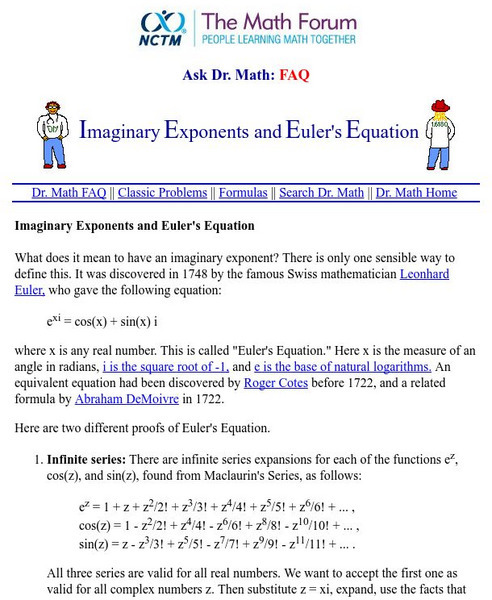Pennsylvania Department of Education
Euler's Formula
Young scholars explore geometry by defining a list of vocabulary terms. In this shape characteristics instructional activity, students identify a number of different shapes and discuss the amount of edges, vertices, and faces using the...
Curated OER
Discovering Euler’s Formula for Planar and 3D Figures
In this Geometry instructional activity, 10th graders investigate the number of regions, edges, and vertices of sixteen planar figures in order to discover Euler’s Formula. The two page instructional activity contains a chart for...
Math Medics
S.o.s. Math: Algebra
This lesson provides basic instruction on the major concepts in algebra. Content includes a focus on fractions, units of conversion, complex numbers, quadratic equations, factorization and roots of polynomials, solving equations, systems...
National Council of Teachers of Mathematics
The Math Forum: Imaginary Exponents and Euler's Equation
"What does it mean to have an imaginary exponent?" This site has an exceptional answer and explains it in two different ways
National Council of Teachers of Mathematics
The Math Forum: Ask Dr. Math: Derivation of De Moivre's Formula
A formula using Euler's formula to derive DeMoivre's theorem. Basic calculus skills of differentiating and integrating are required to understand this explanation.
Other
Brown Math: Remembering Trig Identities
Faced with a large number of trigonometric identities, students tend to try to memorize them all. This site the emphasis is on understanding how the functions work and on memorizing only about a half dozen of them - all the others work...
CK-12 Foundation
Ck 12: Geometry: Polyhedra Study Guide
[Free Registration/Login may be required to access all resource tools.] This study guide reviews how to classify polyhedra, Euler's formula, and regular polyhedra.
Mathigon
Mathigon: Graphs and Networks: Euler's Formula
This lesson focuses on Euler's Equation. Any (finite) graph can be constructed by starting with one vertex and adding more vertices one by one. We have shown that, whichever way we add new vertices, Euler's equation is valid. Therefore...








